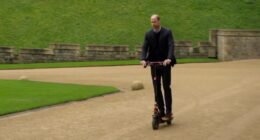Share this @internewscast.com
Researchers exploring dementia have identified an amino acid that was once thought to enhance memory and cognition, but it can, in fact, activate a gene linked to the development of Alzheimer’s disease.
In a 2022 study featured in Cell Metabolism, scientists built on prior research focusing on an enzyme known as ‘PGDH’. This enzyme, commonly found in the blood of older adults, can initiate the onset of Alzheimer’s while affecting over half of dementia patients. According to the NHS, dementia afflicts more than 944,000 people in the UK, with about one in every 11 people aged 65 and older impacted.
Dementia serves as an umbrella term for various conditions that impact memory, thinking, language, mood changes and general brain function.
Alzheimer’s disease is a progressive brain disorder that deteriorates memory, cognitive skills, and the ability to manage everyday tasks, as reported by Surrey Live.
It stands as the leading cause of dementia.
The Alzheimer’s Society points out that studies on dementia receive significantly less funding compared to cancer research, which engages four times more scientists.
Following their research findings, scientists advise against consuming supplements with the amino acid serine or using such products for Alzheimer’s treatment.
The study revealed, through an analysis of brain soft tissue, that PGDH enzyme levels were notably higher in those with Alzheimer’s, including individuals with “a-symptomatic” versions of the disease. PGDH is essential for producing the amino acid serine, with increased PGDH levels indicating that Alzheimer’s patients are already generating excess amounts of serine.
Study co-author Riccardo Calandrelli, who serves as a research associate in Professor Sheng Zhong’s laboratory, stated: “Anyone looking to recommend or take serine to mitigate Alzheimer’s symptoms should exercise caution.”
The research revealed that heightened PGDH presence can also serve as a marker for dementia severity and the extent of cognitive deterioration.
PGDH concentrations proved significantly higher in the brains of Alzheimer’s sufferers, leading scientists to hope it might provide the foundation for a revolutionary early dementia screening capable of detecting the condition’s emergence even in healthy adults.
“The fact that this gene’s expression level directly correlates with both a person’s cognitive ability and disease pathology is remarkable,” said Professor Zhong.
“Being able to quantify both of these complex metrics with a single molecular measurement could potentially make diagnosis and monitoring progression of Alzheimer’s disease much simpler.”















